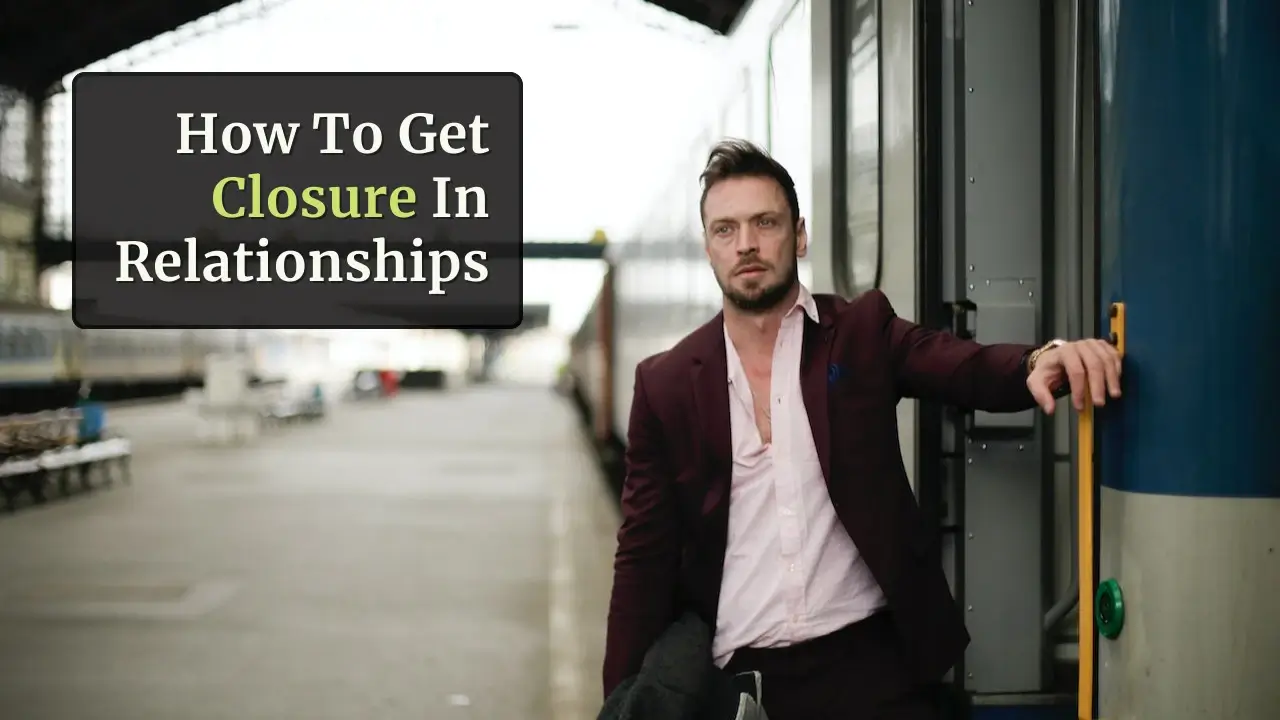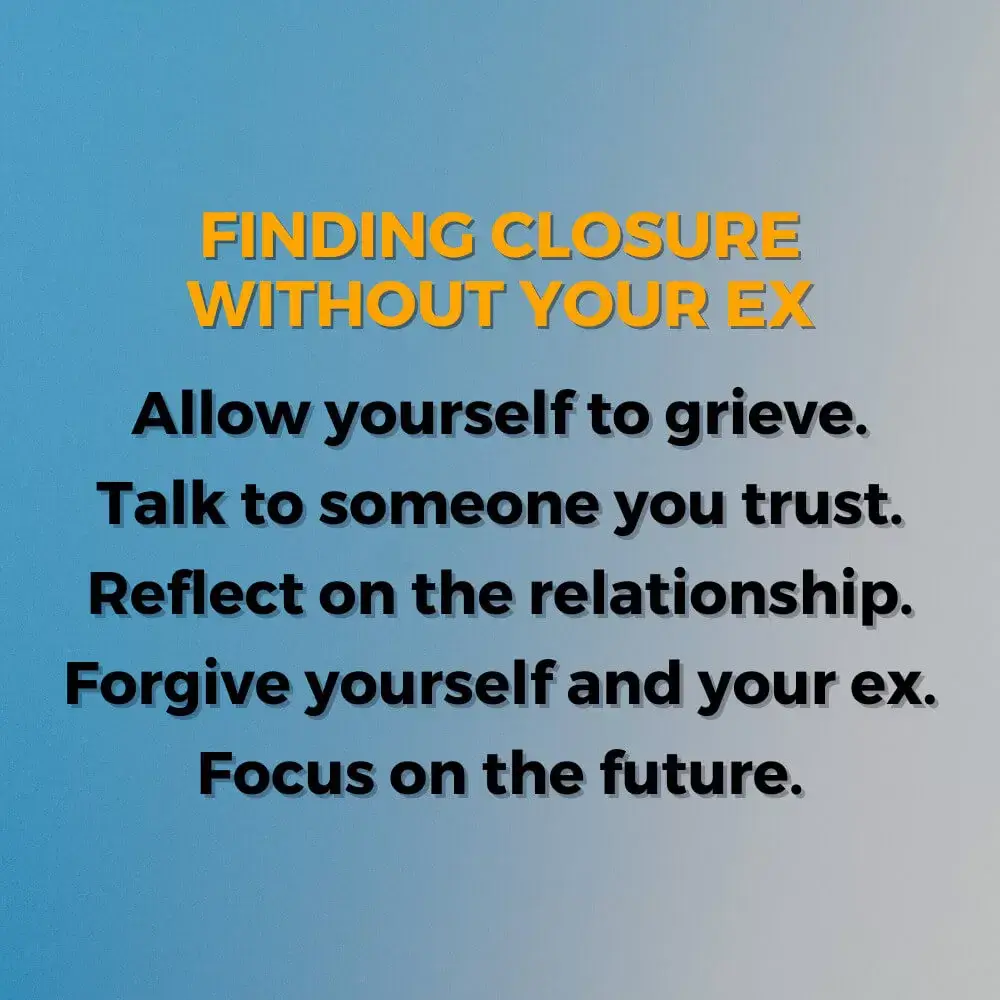Reading time: 12 minutes
When a relationship ends, it often leaves a storm of emotions and unanswered questions in its wake.The end of a relationship creates a psychological need for closure—a way to make sense of what happened and to understand the lessons it taught you.
Without closure, it can be difficult to move forward and open up to new relationship possibilities.
The quest is to find peace after a relationship ends. Think of closure as a learning experience to help you grow and get ready for future relationships.
But how do you achieve proper closure?
“The most difficult aspect of moving on is accepting that the other person already did.” — Faraaz Kazi
How To Get Closure In A Relationship: 10 Steps To Follow
A relationship cycle moves through these stages: initiation, peak, conflict, end, seeking closure, achieving closure, and moving forward.

Closure gives us a sense of resolution, letting us untangle the knots in our mind.
But closure is not just one final conversation — it is a ten-step process.
- Reflect on the Relationship: Reflect on the relationship as if it were a movie. But reflect as if it were something that was in your past. It would help you accept your current emotions and mental experiences. Try to figure out why things ended the way they did. Pick up lessons to help you better handle your future relationships.
- Embrace the Healing Process: Tell yourself that finding closure is a part of your healing journey. You need it for your mental and emotional well-being, not to repair the relationship. Give yourself the time and space to heal.
- Closure Talk: This is the crux of the closure process. A closure talk is that one final conversation with your ex. It is the last opportunity to express your thoughts, emotions, and words to your ex-partner. It lets both of you express any remaining feelings. It helps you both start to emotionally disconnect from each other. A relationship expert can help you facilitate a productive closure talk.
- Disengage From Your Ex: After the closure talk, create emotional and physical distance from your ex. Limit or cut off contact to break attachment bonds and decrease the co-dependency. Let go of your unresolved feelings and the things you couldn’t do. Stop overthinking how you could have kept the relationship.
- Forgive and Address Lingering Feelings: The closure process requires forgiveness—both of yourself and your ex-partner. Forgiveness helps release feelings of regret or desire for revenge. Tell them you forgive them, and won’t hold any feelings for them — love, hate, regret, guilt, or anger. Ask them to do the same. Seek help from a professional counselor if you can’t forgive them.
- Focus on Personal Growth: You will feel empty and time alone will haunt you. Use this time to reflect on how you can grow from the experience. Start a journey of reinventing yourself from what you learned about yourself. Closure isn’t just about ending the past; it’s about fostering personal growth and preparing for healthier relationships ahead.
- Manage Negative Emotions: Breakups come with many negative emotions — anger, regrets, sadness, and anxiety. If you let them linger, they can take a toll on your mental health and your relationships with others. Closure is also a process of managing these feelings, reducing their impact on your overall well-being. Learn how to embrace your negative emotions.
- Consider Social Issues: Closure isn’t just your internal process or even a two-party process. It also involves handling the social expectations and public sentiments about your relationship. You may have to rethink some ways of presenting yourself socially. Like getting permission from someone inviting you to a party if you may go there alone, for example. Avoid toxic people who hurt you, take advantage of you, or block your emotional recovery.
- Move Forward: Focus on moving forward. Closure is useless if it doesn’t allow you to move on to new possibilities. Of course, everyone’s path forward is different. Find what works best for you and make plans for what to do next. You could spend some time away for self-reflection, solo traveling, or engaging in new activities.
- Seek Support: You don’t have to do it alone — don’t hesitate to seek support if you need it. Talk to friends, join a support group, or seek professional help from a counselor or therapist.
The need for closure is a universal human need. It helps you regain emotional balance in your life and regain a sense of self-identity after a relationship ends.
What Is A Closure Talk?
A closure talk is a conversation between two people who have broken up to clear ambiguity and achieve mutual understanding, peace, and a sense of resolution.
The purpose of a closure talk is to help the separated people move forward. It is one last opportunity to touch on unresolved matters, sort out misunderstandings, and express any residual emotions.
Do it respectfully and constructively.
A well-structured closure talk discusses these general topics:
- Reasons For The Breakup: Each individual can share their perspectives on what led to the relationship’s end.
- Unresolved Questions: A closure talk provides a space to ask lingering questions and seek clarity.
- Feelings and Emotions: It allows both parties to express their feelings honestly and respectfully.
- Lessons Learned: Discussing what each person has learned from the relationship can foster growth and personal development.
- Forgiveness: The most essential thing in closure is to forgive each other so that each can move on in peace.
- Future Expectations: A closure talk can help establish boundaries and expectations for any future interactions, if applicable.
Every closure talk needs three things from you:
- ability to forgive without judging.
- willingness to listen actively, and
- patience to sit with your emotions,
“What’s broken is broken—and I’d rather remember it as it was than mend it and see the broken places as long as I lived.” — Margaret Mitchell
Breakups and closure talks need safe spaces where people can talk openly and non-threateningly.
How To Get Closure When A Relationship Ends Badly?
When a relationship ends on a sour note, achieving closure can seem like a monumental task. However, with a focused approach and inner strength, you can find peace.
Here’s a simple guideline on how to achieve closure in such cases:
- Recognize Your Feelings: Don’t suppress your emotions. Allow yourself to feel the pain, anger, disappointment, or regret that comes with a badly ended relationship.
- Seek Support: Don’t go through your recovery process without support. Reach out to friends, family, or professional counselors who can provide perspective and emotional assistance.
- Reflect on the Relationship: Understand what went wrong. Use this reflection for self-improvement and to avoid repeating the same mistakes in future relationships.
- Establish No Contact: Distance yourself from your ex-partner. This provides the necessary space to heal, reduce emotional dependency, and build independence.
- Practice Forgiveness: Forgiving your ex-partner, and more importantly, forgiving yourself, is critical. This can be a long process, but it’s a vital step in achieving closure.
- Embrace Personal Growth Activities: Engage in activities that promote self-love and confidence. Gift yourself things you love. Take yourself to exotic restaurants. Start hobbies like dance-fitness regimens, pottery, or even solo traveling.
- Envision a Positive Future: Finally, believe in the possibility of a healthier and happier future. While the past can’t be changed, your future is in your hands.
“Sometimes good things fall apart so that better things can fall together.” — Marilyn Monroe
How do you get closure from one-sided love?
Achieving closure from one-sided love (sometimes called limerence) can be emotionally taxing.
Here are some steps to achieve closure from a one-sided love for personal growth and mental peace:
- Acknowledge Your Feelings: Validate your emotions without judgment. Understand that it’s okay to feel hurt or rejected.
- Express Your Emotions: Find a safe space to express your feelings, be it through journaling, talking to a friend, or seeking professional help like therapy.
- Acceptance: Accept the reality that the other person doesn’t share the same feelings for you. This step might be difficult, but it’s vital for moving forward.
- Reframe Your Thoughts: Instead of dwelling on the pain, reframe your perspective to see this as a learning experience. Identify what you’ve gained from this – resilience, emotional understanding, etc.
- Self-Care: Focus on taking care of your physical and mental well-being. Engage in activities you enjoy, exercise regularly, maintain a healthy diet, and ensure you’re getting enough rest.
- Cultivate Self-Love: Use this time to cultivate self-love and appreciation. Recognize your worth and understand that someone else’s inability to see it doesn’t diminish it.
- Find Closure From Within: Closure often comes from within. Forgive yourself, release the past, and make peace with the situation.

How to set boundaries in future relationships?
The six essential boundaries ensure relationships remain healthy and help prevent potential conflicts and misunderstandings that might lead to unhappiness or even abusive behavior.
Post-breakup, closure plays a big role in shaping one’s future boundaries.
We must reconsider and redesign our boundaries after any relationship breakdown.
- Self-care and Growth through Boundaries: Setting boundaries in future relationships promotes self-care and growth, and helps avoid repeating past mistakes.
- Open Communication in Boundary Setting: Clearly communicating limits and expectations forms a foundation built on mutual respect and understanding.
- Recognizing Personal Needs: Establishing boundaries involves acknowledging one’s needs and desires, supporting personal growth, and nurturing emotional well-being.
- Maturity through Boundary Recognition: Acknowledging the importance of boundaries is a sign of maturity, indicating an understanding of one’s worth and prioritization of emotional health.
FAQs
Is it okay to ask your ex for closure after a breakup?
Yes, it is generally acceptable to ask your ex-partner for closure. It can allow both of you to express unresolved feelings, clarify misunderstandings, and better understand what led to the relationship’s failure. It can also be a chance to part on good terms, or at least with mutual respect and understanding.
However, this doesn’t apply in relationships where your ex is a narcissist, sociopath, or psychopath. In such scenarios, seeking closure might expose you to further manipulation or emotional harm, as these individuals may not be capable of offering honest and empathetic responses. In these cases, it is best to seek closure on your own or with the help of a professional counselor.
Should I contact my ex for closure?
Yes, you can contact your ex for closure, especially if you have a high “need for closure.” However, consider the current dynamics between you two. If the separation was amicable and respectful, a closure talk might help clear any lingering doubts or questions. But if the relationship was toxic or abusive, reaching out may expose you to further harm or manipulation. Remember, closure is more of a personal journey and often takes self-reflection and acceptance more than a conversation with an ex. Focus on your emotional well-being and consult a professional counselor if you’re unsure about reaching out.
How to give closure to your ex when you break up?
They deserve closure, especially when you initiated the breakup. Mutually agree on a specific time. Request that they come mentally prepared, with a set of queries.
Be Clear About Your Intentions: Set the right expectations and tell them at the start that the breakup is irreversible. Communicate your decision firmly but kindly. Be honest, yet empathetic about why you can’t continue the relationship. A proper closure ends ambiguity and confusion.
Listen To Their Feelings and Thoughts: Closure is a two-way street. Allow your ex-partner to express their feelings and thoughts. This will make them feel heard and respected, helping the process of closure.
Address Unresolved Issues: Discuss any unresolved issues or questions that your ex-partner may have. Be transparent and try to truthfully answer them, without blame or bitterness. If you do not have answers, tell them so.
Offer Practical Assistance: If you live together, discuss logistics such as moving out, dividing possessions, and other practicalities. If possible, help them find a new place or offer help in relocating.
Discuss Boundaries: Discuss and establish post-breakup boundaries. Talk about how you would want to handle future contact, social media connections, mutual friends, and other aspects where your lives intersect.
End on a Positive Note: Try to end the conversation on a positive note. You could express your wishes for their happiness and growth, and tell them there’s no animosity despite the breakup.
Finally, please do not give them false hopes.
Is closure necessary?
Yes, closure is often necessary (especially for those with a high need for closure) since its lack can cause feelings of stress, uncertainty, inadequacy, emotional instability, social loneliness, and vague sadness. However, you cannot expect a toxic ex to give you closure; you have to achieve it yourself.
Can a relationship end without closure?
Yes, indeed, many relationships end without closure. Closure is the feeling of understanding why a relationship ended and being able to accept it.
It can be difficult to find closure if your ex is unwilling to talk to you, or if the relationship ended in a way that was sudden or unexpected.
However, it is possible to find closure with a counselor’s help even if you don’t get all the answers you want.
Final Words
The main goal of getting/giving closure is to end the relationship respectfully and kindly so that you may leave each other and move forward with understanding and peace.
As J.P. Morgan said, “The first step towards getting somewhere is to decide that you are not going to stay where you are.”
From that point forward, patience and self-care are the two most important things.
Finally, everyone has a different journey of recovering after closure, and there is no set timeline for that healing process to complete.
√ Also Read: How to get closure when someone ghosts you?
√ Please spread the word if you found this helpful.
• Our Story!


